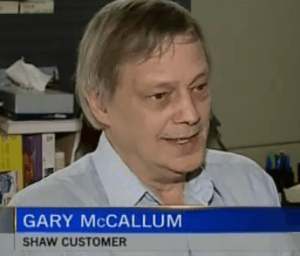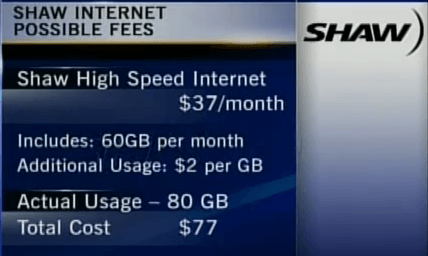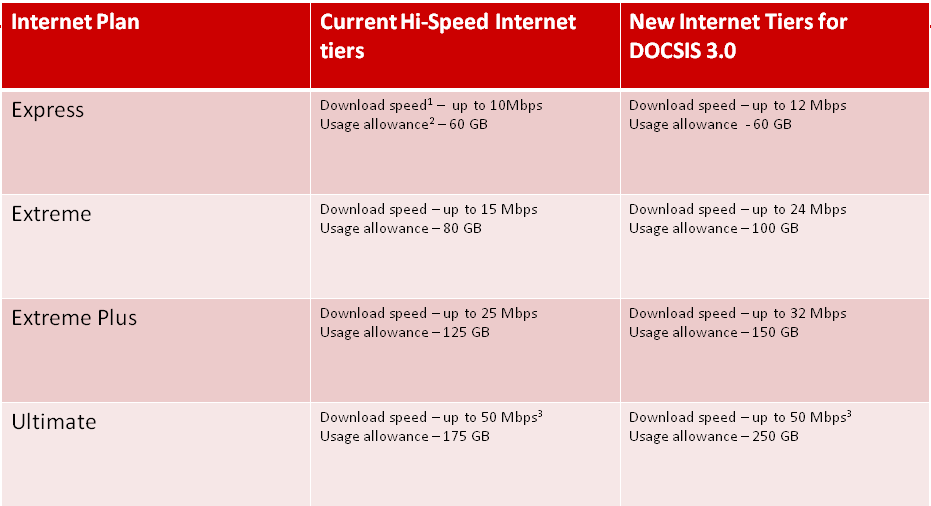 Gary McCallum, a Shaw customer in Edmonton, Alberta, has received word his broadband service is about to get more expensive — a lot more expensive.
Gary McCallum, a Shaw customer in Edmonton, Alberta, has received word his broadband service is about to get more expensive — a lot more expensive.
“Holy crap, it’s like text messaging [bill shock] all over again when your broadband bill arrives and you are now looking at hundreds of dollars instead of the $40 or $50 you used to pay,” McCallum told CTV News.
McCallum, and other designated “heavy users,” are receiving letters in the mail from Shaw notifying them they have been exceeding the company’s declining usage limits imposed on its broadband service. If they exceed the limits again, they may be subject to penalty fees of as much as $2 per gigabyte.
“I’m upset about the backdoor tactics,” McCallum complains. “They keep it secret and then lambaste you later.”
Most Shaw customers will be forced to confine their usage to 60GB per month, the limit on the company’s most popular broadband plan. If they don’t, after some warning, they’ll pay a stiff fine. Just 20GB of overlimit usage will more than double the average customer’s broadband bill, currently around $37 a month.
A house full of teenagers watching Netflix or downloading files could cost far more than that.
Company officials deny the potential revenue bonanza is unjustified.
 Customers who use more will pay more, admits Terry Medd, vice-president of operations for Shaw Communications in Calgary.
Customers who use more will pay more, admits Terry Medd, vice-president of operations for Shaw Communications in Calgary.
“It’s video over the Internet that’s driving a lot of this cost,” he said. However, most Shaw Internet customers won’t hit their caps, Medd claims, suggesting it should affect fewer than 10 per cent of customers.
“The average user consumed about one-third of what the cap is. In other words, we’ve set the caps at three times the average usage. For the average user, there’s no concern here,” Medd said.
However, Shaw recently reduced their usage caps on virtually all of their Internet plans, making it more likely customers will be snagged by overlimit fees.
Some customers want to know what they will get if they use far less than their plan allowance.
Don McGregor believes Shaw’s plan to charge Internet users for the data they use is fair and equitable, so long as those who use less than the allowance get a break on their bills.
“Shaw should plan on refunding fees for any use of data below the contracted amount,” the Edmonton resident wrote in a letter to the editor published in the Edmonton Journal. “Since 90 per cent of Shaw’s subscribers use less than the full GB capacity they pay for, I am sure these subscribers’ refund cheques are in the mail.”
 Don, like other Canadians, is about to learn Internet Overcharging is never about fairness or saving customers money. It’s about charging customers more for the same service they used to receive for less, without any improvements. ISPs will not provide true “usage pricing” for consumers because it would slash revenue from their broadband service.
Don, like other Canadians, is about to learn Internet Overcharging is never about fairness or saving customers money. It’s about charging customers more for the same service they used to receive for less, without any improvements. ISPs will not provide true “usage pricing” for consumers because it would slash revenue from their broadband service.
But western Canadians need not be victims of Shaw’s overcharging. Telus, which sells landline-based DSL service in British Columbia and Alberta says it has upgraded its facilities to accommodate usage demands and won’t expose customers to overlimit fee bill shock.

Telus offers a way out of Shaw's Money Party hangover
Although Telus’ website does show usage limits, company officials claim they are rarely enforced, and not at the subscriber’s expense.
Telus could make a significant dent in Shaw’s customer base by dropping them altogether, which will save the phone company from these kinds of silly legal gymnastics in their FAQ:
Why do you call your service unlimited, when my monthly usage is limited?
We refer to TELUS High Speed as being unlimited because you get unlimited hours of monthly access.
If you do not want to play Shaw’s Internet Overcharging game, perhaps spending time with a new Xbox 360 would be better? Telus is giving them away to qualified new customers signing up for service.
[flv width=”480″ height=”380″]http://www.phillipdampier.com/video/CTV Edmonton Shaw Internet Overcharging 1-7-11.flv[/flv]
CTV News in Edmonton informs Alberta’s Shaw customers their broadband service could get a lot more expensive. (2 minutes)
 “Feedback from ISPs who have deployed usage-based Internet tiers has confirmed that two factors are key to success: accurate usage measurement and quick, proactive notifications,” PerfTech vice president of sales Jane Christ said in a statement.
“Feedback from ISPs who have deployed usage-based Internet tiers has confirmed that two factors are key to success: accurate usage measurement and quick, proactive notifications,” PerfTech vice president of sales Jane Christ said in a statement.

 Subscribe
Subscribe










